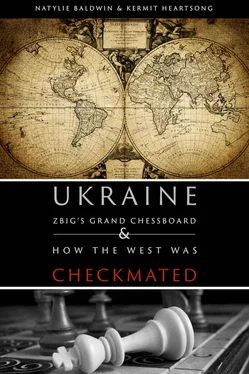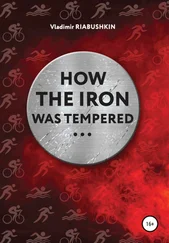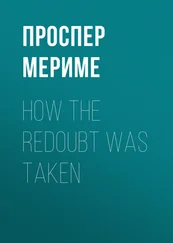Kermit Heartsong - Ukraine - ZBIG's Grand Chess Board & How The West Was Checkmated
Здесь есть возможность читать онлайн «Kermit Heartsong - Ukraine - ZBIG's Grand Chess Board & How The West Was Checkmated» весь текст электронной книги совершенно бесплатно (целиком полную версию без сокращений). В некоторых случаях можно слушать аудио, скачать через торрент в формате fb2 и присутствует краткое содержание. Год выпуска: 2015, Жанр: Политика, на английском языке. Описание произведения, (предисловие) а так же отзывы посетителей доступны на портале библиотеки ЛибКат.
- Название:Ukraine: ZBIG's Grand Chess Board & How The West Was Checkmated
- Автор:
- Жанр:
- Год:2015
- ISBN:нет данных
- Рейтинг книги:4 / 5. Голосов: 1
-
Избранное:Добавить в избранное
- Отзывы:
-
Ваша оценка:
- 80
- 1
- 2
- 3
- 4
- 5
Ukraine: ZBIG's Grand Chess Board & How The West Was Checkmated: краткое содержание, описание и аннотация
Предлагаем к чтению аннотацию, описание, краткое содержание или предисловие (зависит от того, что написал сам автор книги «Ukraine: ZBIG's Grand Chess Board & How The West Was Checkmated»). Если вы не нашли необходимую информацию о книге — напишите в комментариях, мы постараемся отыскать её.
Ukraine: ZBIG's Grand Chess Board & How The West Was Checkmated — читать онлайн бесплатно полную книгу (весь текст) целиком
Ниже представлен текст книги, разбитый по страницам. Система сохранения места последней прочитанной страницы, позволяет с удобством читать онлайн бесплатно книгу «Ukraine: ZBIG's Grand Chess Board & How The West Was Checkmated», без необходимости каждый раз заново искать на чём Вы остановились. Поставьте закладку, и сможете в любой момент перейти на страницу, на которой закончили чтение.
Интервал:
Закладка:
Since the beginning of the crisis in the Ukraine, the Western demonization, Congressional posturing, threats, and sanctions, continuously leveled at Eastern Separatists, Putin, and Russia have had a most unintended consequence — they have backfired and, it appears, that they will all fail miserably, in the near-term.
Below please find a point-by-point breakdown of how the Western geopolitical and strategic campaign, aimed at isolating Russia, via an ideology frozen in time, has failed.
Russia China Gas Deal.On May 20, 2014 shortly after the first wave of Western sanctions had taken affect, Russia and China signed a $400 billion natural gas deal, the largest international deal in the history of mankind. The deal purportedly involves Russia supplying 38 billion cubic meters of gas per year to China via a Siberian pipeline project, Altai, and a new eastern pipeline, “Power of Siberia,” for the next thirty years.
For Russia, with an increasingly hostile West leveling round after round of sanctions, this deal represented a diversified market partner and nearly a quarter of Europe’s combined yearly gas imports of 160 billion cubic meters. Should sanctions persist, when the Russian-Chinese gas deal commences in 2018, 38 billion cubic meters of gas will be a powerful bargaining chip.
The deal represents for China, currently the world’s largest oil importer, a stable energy source via two secure pipeline routes, a future potential replacement for coal (its number one source of energy), and imported oil, which has been problematic for China vis-a-vis US disruption.
China’s String of Pearls, the importation route that brings oil to China from Middle Eastern and North African (MENA) suppliers, has been particularly vulnerable via a strategically developed scheme by the US to disrupt Chinese energy security (Gunnar 2014). As stated by geopolitical analyst Ulson Gunnar (2014):
The United States, in a bid to reassert itself in the Pacific and maintain both regional and global hegemony, has committed to years of disrupting China’s oil lifeline and in theory, strangle China’s growth. The US has sown chaos across MENA and attempted to carve off the entire Pakistani province of Baluchistan. (Gunnar 2014)
Natural gas, a cleaner source of energy that is proximate and relatively free from the disruptive polices of the West is, of course, a precious commodity for China.
However, the larger geostrategic and financial implications is that the deal was conducted in yuan and rubles. Further, it is not only the size of the deal struck between two rising powers, one a resources superpower and the other a manufacturing and economic hegemon, it is what this deal symbolizes to the world — an alternative global currency and a multipolar world. All, of course, turbo charged by Western geopolitical blundering, short-sightedness, and a fundamentalist ideology run amok.
Iranian Oil Deal, etc.In August of 2014 Russia and Iran agreed to a $20 billion five year trade deal that encompassed not only oil-gas sales, but the “construction of power plants, energy grids, heavy machinery, consumer goods, and agricultural products,” as stated by Moscow’s Energy Ministry. The deal speaks to the exportation of 500,000 barrels of oil per day to Russia.
The immediate implications of this deal between Russia and Iran represent, among other things, an about-face of Russia’s prior willingness to work with Western imposed sanctions on Iran — in fact, a direct thwarting of those sanctions has begun. Additionally, the Iran — Russian reproachmont signals the beginning of another strategic eastern military, political, and economic partnership, a blow to petrodollar dominance, and the near-term demise of the dollar as reserve currency. And, interestingly, the aforementioned events have been turbo charged by Western geopolitical blundering, shortsightedness, and adherence to a dated ideology run amok.
Multi-Poles
There are now numerous geopolitical poles rapidly taking shape and solidifying, in direct response to the long established order represented by the West as a direct result of the current Ukrainian crisis.
The various rising poles of influence, with Russia part and parcel of nearly every one, is, of course, a clear repudiation of Western boasts of an isolated Russia. It also speaks volumes to another failed Western policy and to a world that has grown tired of the “New World Order” as nations are determinedly seeking something else. Several of the counter-organizations currently growing and solidifying are:
The SCO
The Shanghai Cooperation Organization (SCO) began as the Shanghai Five in 1996 and it represented three-fifths of Eurasia and 25 percent of the world’s population (Hallinan 2014). In 2001, its member states included China, Russia, Kazakhstan, Kyrgyzstan, Tajikistan, and Uzbekistan.
Its major focus is the security of member states, and many recognize the SCO as a counterbalance to NATO. The SCO has also held annual military drills.
The SCO has consistently rebuffed US requests for observer status, and has pressured countries in the region to end US basing rights. The US was forced out of Karshi-Khanabad in Uzbekistan in 2006, and from Manas in Kyrgyzstan in 2014. (Hallinan 2014)
As of today, the SCO has grown to also include new members India, Pakistan, Iran and Mongolia. This represents the single largest expansion of a group dedicated to economic cooperation and security in SCO history (Hallinan 2014).
The BRICS
BRICS is an acronym for Brazil Russia India China South Africa. The term, interestingly enough, was first used in an article written by Jim O’Neill of Goldman Sachs. The article outlined the various synergies — product manufacturing, services exports, raw materials, population size, market demographics, and growth rates — between the countries and how these factors would catalyze by 2050 to make the BRICS the dominant power bloc (Ghosh 2013).
Interestingly, the BRICS countries came together as a result of Mr. O’Neill’s article or, as Jayati Ghosh, economics professor at Jawaharlal Nehru University in New Delhi, states:
Strange things happen in the world. Imagine a grouping of countries spread across the globe, which gets formed only for the simple reason that an analyst for an investment bank decides that these countries have some things in common, including future potential for growth, and then creates an acronym of their names! Bizarre but true. (Ghosh 2013)
Eight years later in June of 2009 the group had its first official meeting in Yekaterinburg, Russia. Since then, the BRICS have met every year. In terms of what this collection of nation-states brings to the table, Ghosh summarizes:
The BRICS now cover 3 billion people, with a total estimated GDP of nearly $14 trillion and around $4 trillion of foreign exchange reserves. Each country is effectively a sub-regional leader. (Ghosh 2013)
Whether or not the initial impetus of the BRICS countries was to move out of the Western political economic orbit, events that have taken place over the intervening years have instigated their now-deliberate secession from the New World Order.
Not only has investment between the countries grown, but they have also sought to change, from the inside, the workings of the current political and economic status quo. In 2013, the BRICS acted to reform IMF voting procedures by pledging to invest $75 billion. However, they have also increased bilateral trade in the currency of each respective nation and they have sought a shared approach in foreign policy, based upon a more constructive and empowering approach for trading partners and their citizens (Ghosh 2013).
The BRICS appeared content to move measuredly toward their goal of greater economic and political integration while continuing to operate within the orbit of the West and its various banking, credit, and exchange institutions. And while there had been talk of an independent bank, there appeared to be no immediate rush to form one. All that, of course, changed rather dramatically.
Читать дальшеИнтервал:
Закладка:
Похожие книги на «Ukraine: ZBIG's Grand Chess Board & How The West Was Checkmated»
Представляем Вашему вниманию похожие книги на «Ukraine: ZBIG's Grand Chess Board & How The West Was Checkmated» списком для выбора. Мы отобрали схожую по названию и смыслу литературу в надежде предоставить читателям больше вариантов отыскать новые, интересные, ещё непрочитанные произведения.
Обсуждение, отзывы о книге «Ukraine: ZBIG's Grand Chess Board & How The West Was Checkmated» и просто собственные мнения читателей. Оставьте ваши комментарии, напишите, что Вы думаете о произведении, его смысле или главных героях. Укажите что конкретно понравилось, а что нет, и почему Вы так считаете.











